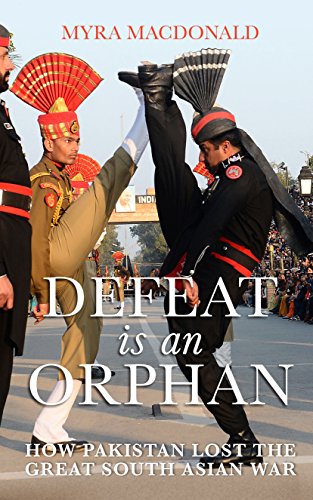
Myra Macdonald’s Defeat Is an Orphan, published in 2017, is a compelling and incisive examination of the turbulent post-nuclear history of India-Pakistan relations. Long unread on my own bookshelf, I found the book to be a crucial read for understanding the current geopolitical landscape of South Asia.
Macdonald, with her journalist’s eye for detail and a historian’s depth, masterfully traces the rollercoaster ride of conflict and diplomacy that followed the 1998 nuclear tests. The central argument is stark: Pakistan decisively lost the Great South Asian War, not because of India’s overwhelming military victory, but because of Pakistan’s own strategic miscalculations and dysfunction.
The core of Macdonald’s analysis lies in the paradoxical impact of nuclear weapons. While they restored a certain strategic parity and shielded Pakistan from full-scale retaliation due to its smaller size, they ultimately proved to be its undoing. The book effectively dissects how the nuclear shield encouraged a reckless reliance on militant proxies (jihadis) even as those proxies began to spin out of control both internally and externally. This reliance sealed Pakistan into a cycle of militarism and denial.
Macdonald successfully argues that while India, despite its flaws, was able to move toward economic and political consolidation, Pakistan became increasingly trapped. The book chronicles this downward spiral through key moments—from the Kargil conflict and military confrontation in the plains to the hijacking of an Indian plane and the horrific assault on Mumbai—showing how the ability to stake a serious claim to Kashmir and influence events in Afghanistan diminished rapidly.
Defeat Is an Orphan is thought-provoking and exceptionally well-researched. It offers a nuanced perspective on South Asia’s geopolitical dynamics by focusing on the military’s dominant role in shaping Pakistan’s national policy and the country’s repeated failures to adapt.
This is not merely a historical account; it is a critical analysis that remains remarkably relevant years after its publication. For anyone seeking to understand the roots of ongoing regional tensions and the complex interplay of nuclear deterrence, proxy warfare, and state policy in South Asia, this book is an essential reading. It powerfully makes the case that this “war… was not so much won by India as lost by Pakistan.“


Leave a Reply